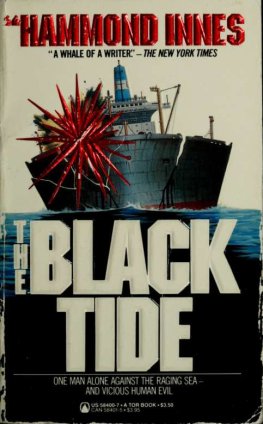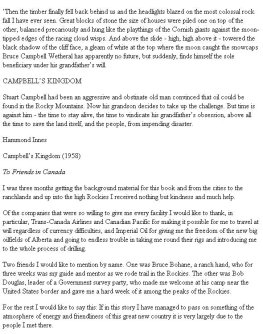Hammond Innes - The Black Tide
Here you can read online Hammond Innes - The Black Tide full text of the book (entire story) in english for free. Download pdf and epub, get meaning, cover and reviews about this ebook. genre: Adventure. Description of the work, (preface) as well as reviews are available. Best literature library LitArk.com created for fans of good reading and offers a wide selection of genres:
Romance novel
Science fiction
Adventure
Detective
Science
History
Home and family
Prose
Art
Politics
Computer
Non-fiction
Religion
Business
Children
Humor
Choose a favorite category and find really read worthwhile books. Enjoy immersion in the world of imagination, feel the emotions of the characters or learn something new for yourself, make an fascinating discovery.
- Book:The Black Tide
- Author:
- Genre:
- Rating:4 / 5
- Favourites:Add to favourites
- Your mark:
- 80
- 1
- 2
- 3
- 4
- 5
The Black Tide: summary, description and annotation
We offer to read an annotation, description, summary or preface (depends on what the author of the book "The Black Tide" wrote himself). If you haven't found the necessary information about the book — write in the comments, we will try to find it.
The Black Tide — read online for free the complete book (whole text) full work
Below is the text of the book, divided by pages. System saving the place of the last page read, allows you to conveniently read the book "The Black Tide" online for free, without having to search again every time where you left off. Put a bookmark, and you can go to the page where you finished reading at any time.
Font size:
Interval:
Bookmark:
Hammond Innes
The Black Tide
PART ONE
CHAPTER ONE
It was New Years Eve. The last weather forecast had given wind south-westerly force 5 increasing to 6 with poor visibility in sleet or snow showers. Between Lands End and the Scillies, and already into the northbound traffic lane, the tanker Petros Jupiter, with 57,000 tons of crude for the Llandarcy refinery in South Wales, made a long slow turn to starbd, finally settling on to a course of 95.
Her cargo had been resold late that afternoon, but delay in obtaining signature on certain documents had meant that it was not until 22.54 that her master was informed of the transaction and instructed to alter course for Rotterdam. Less than an hour later, at 23.47, the alarm bells sounded on the bridge.
Like many of the early VLCCs, the Petros Jupiter was just about worn out. She had been built for the Gulf Oil Development Company in the sixties, at the height of the Japanese expansion in shipbuilding. Her design life at maximum efficiency was about eight
years and GODCO had sold her to a Greek company in 1975. She was now in her seventeenth year and, since rounding the Cape, steam leaks had been creating an almost permanent fog in the engine-room with the evaporator barely able to produce sufficient distilled water to replace the loss. The log would show that on two previous occasions loss of distilled water had been so great that the automatic cut-out on the single boiler had been tripped.
For ships taking the inside route between Lands End and the Scilly Islands the northbound traffic lane is the one nearest to the mainland. But the Petros Jupiter had been on the outer edge of the lane when she had made the turn to starbd, and being on a slow-steam voyage she was moving at barely 11 knots through the water, so that when the alarm bells sounded and the single high pressure boiler cut out, bringing both the steam turbines to a halt, she was still not clear of Lands End.
Engine-room staff immediately switched to auxiliary power to keep the alternators going and to provide electricity, but power to drive the ship could not be restored until the accumulation of leaks in the steam pipework had been repaired and the loss of distilled water for the boiler reduced. The ship gradually lost way until finally she lay broadside to the waves, rolling sluggishly.
There she remained for over two hours, during which time she drifted about three miles in the general direction of Lands End. By then emergency repairs had been completed and at 02.04 she was under way
again. And then, at 02.13, the unbelievable happened: the secondary reduction gear, the gear that drove the single propeller shaft, was stripped of its teeth. A journalist would write later that it had made a very expensive sound, which was the phrase used by Aristides Speridion, the Greek second engineer, who had been at that end of the engine-room when it happened.
With the secondary reduction gear useless, there was no way the Petros Jupiter could proceed and at 02.19 the master contacted Lands End coastguard station on VHF to inform the watch officer of the situation and enquire about the availability of a tug.
The tanker was now lying helpless, wind-rode and wallowing heavily, her hull broadside to the sea, which were big and breaking. If she had been fully loaded she might still have survived, but half her cargo had been off-loaded at Corunna and she was riding quite high out of the water, her huge slab-sided hull acting as a giant sail.
Her position at this time was 8 miles from Lands End with the Longships light bearing 058. The wind was still south-westerly, still increasing, and the barometer was falling. The latest forecast was for southwest 7 increasing to gale 8, veering later with a possible temporary increase to strong gale 9.
The coastguard officer on watch at Lands End told a reporter later that at this point, in the early hours of the morning with the threat of another Torrey Canyon on his hands, he very much wished he still had his SAR radar capability so that he could have monitored the tankers drift. Unfortunately, the radar had been
dismantled when the new coastguard station for the South West on Pendennis Point, at the entrance to Falmouth, had been completed. Even so, it did not take him long to figure out that the Petros Jupiter would need to have a tow line on board within the next four to five hours if she was not to be driven on to the rocks at Lands End. He informed the master accordingly, warning him not to place too much reliance on his anchors and only to use them when the depth of water was shallow enough to give him a good scope of chain. At 02.23 he alerted the Falmouth station officer of the tankers situation enquiring, on behalf of the master, whether there was a tug stationed in the vicinity. Fortunately the Dutch tug based on Falmouth was in port.
Nevertheless, almost another hour went by before the master finally requested the coastguards to inform Lloyds that tug assistance was required. This delay may have been due to the Petros Jupiter contacting other ships in the vicinity. It would certainly explain why she did not speak direct on W/T with Telecom International at the Lands End radio station, all their messages being routed through Lands End coastguard station on VHF.
The tug left immediately, steaming out past Pendennis Point at 03.27 with an ETA at the probable position of the drifting tanker of about 06.30. By then Falmouth coastguards had alerted the Naval Flag Officer, the Sennen lifeboat had been put on stand-by and the duty officer at the Department of Trades Marine Division, Sunley House, High Holborn, had
been informed and had immediately called the retired admiral who headed the Marine Pollution Control Unit.
As anticipated by the forecast, the weather was now worsening rapidly so that by 04.00 the wind was force 8, gusting 9, and the tug, out from under the lee of the Lizard and punching westward into heavily breaking seas, was forced to reduce speed. Shortly before 05.00 the tug master contacted the Petros Jupiter and informed her master that owing to heavy seas his ETA would now be 07.30 or even later.
By then the tide had turned, wind and tide pushing the ship in a north-easterly direction. Falmouth coastguards, plotting the shifting direction of the tidal stream between Lands End and the Scillies, calculated that with a wind drift of approximately one knot the ship would go aground in the vicinity of the Longships about an hour before the tug could reach her. This warning was passed to the master and the advice repeated to let go his anchors when he was in a depth that would give him sufficient scope of chain. In the weight of wind and, with the seas now big, the chain would almost certainly snap, but there was just a chance that the anchors might hold long enough for the north-going tide to take the tanker clear of the Longships and, with the extra fetch provided by Whitesand Bay, the tug might still get a line on board before she struck.
Meanwhile, the secretary of the Sennen lifeboat, in consultation with his coxn, had decided to launch. The time of launch was 04.48 and the lifeboat reached
the casualty at 06.07. By then the Petros Jupiter, with two anchors down and her bows pointed in the general direction of the Wolf Rock, was barely a mile from the Longships. An hour later, as dawn began to break, first one anchor chain, then the other parted, and the lifeboat, which was lying in the lee of the tankers stern, reported the grey granite tower of the lighthouse just visible through mists of wind-blown spray and driving snow. It was very close, the coxn radioed.
It was a dark, cold dawn, full of scudding clouds. A Sea King helicopter from RNAS Culdrose, hovering overhead, taking photographs and checking for pollution, gave the distance between the tankers stern and the lighthouse as barely 500 metres. The pilot also reported that he could see no sign of the tug. This information was passed to the MPCU at Sunley House, which was now fully manned and already operating on the assumption of a major disaster, alerting tugs and aircraft fitted with spraying equipment and arranging for the transportation of stock-piled dispersants to Lands End.
Font size:
Interval:
Bookmark:
Similar books «The Black Tide»
Look at similar books to The Black Tide. We have selected literature similar in name and meaning in the hope of providing readers with more options to find new, interesting, not yet read works.
Discussion, reviews of the book The Black Tide and just readers' own opinions. Leave your comments, write what you think about the work, its meaning or the main characters. Specify what exactly you liked and what you didn't like, and why you think so.





